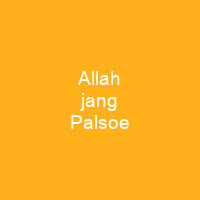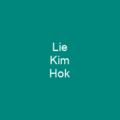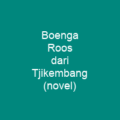Allah jang Palsoe: A Journey Through Time and Values
Imagine a world where two brothers stand at the crossroads of morality and materialism, each choosing a path that will shape not just their lives but also the very fabric of society. Is one brother’s pursuit of wealth truly worth sacrificing his soul? This is the question that Kwee Tek Hoay grapples with in his 1919 stage drama, Allah jang Palsoe.
The Brothers’ Dilemma

The story begins with Kioe Lie and Kioe Gie, two brothers who leave their home in Cicuruk to seek fortune. Three years later, they have taken different paths: one has become a successful editor, while the other is a generous philanthropist. Yet, when faced with the temptation of power and wealth, both brothers are forced to confront the true cost of their choices.
Money vs. Morals
Can money buy happiness? This question haunts Kioe Lie as he is offered a business that could change his life but at what price? His decision to prioritize his ambitions over his family’s well-being sets the stage for a series of events that challenge both brothers’ values.
The Climax and Resolution
As years pass, Kioe Gie remains true to his principles, even when it means resigning from his position. Meanwhile, Kioe Lie’s pursuit of wealth leads him down a dark path, ultimately resulting in tragedy. The play explores the consequences of prioritizing money over morals and personal relationships, leaving audiences with much to ponder.
A Pioneer in Chinese Malay Theatre
Allah jang Palsoe is more than just a story; it is a milestone in the development of Chinese Malay theatre. Written by Kwee Tek Hoay, who was deeply influenced by his upbringing and cultural background, this play reflects the complexities of identity and values.
The Play’s Impact and Legacy
Republished in 2006 with updated spelling, Allah jang Palsoe continues to be performed today. Its themes resonate across generations, making it a timeless piece that explores the eternal struggle between material gain and moral integrity.
A Lasting Legacy
What lessons can we learn from Kioe Lie and Kioe Gie’s journey? As Allah jang Palsoe continues to be performed, it serves as a reminder that true happiness cannot be bought with money alone. It is a testament to the enduring power of storytelling in shaping our values and guiding us through life’s challenges.
The play’s influence can be seen in other works by Kwee Tek Hoay, cementing its place as a pioneering work in Indonesian stage drama. Its popularity among ethnic Chinese communities underscores its relevance and impact, making it a valuable piece of cultural heritage that continues to inspire new generations.
You want to know more about Allah jang Palsoe?
This page is based on the article Allah jang Palsoe published in Wikipedia (retrieved on December 1, 2024) and was automatically summarized using artificial intelligence.







